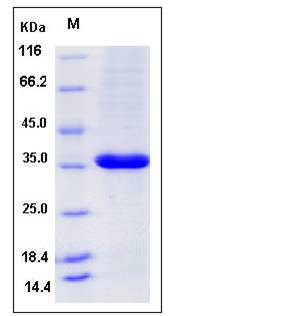Human PCNA Protein (His Tag)
ATLD2
- 100ug (NPP4145) Please inquiry
| Catalog Number | P12131-H07B |
|---|---|
| Organism Species | Human |
| Host | Baculovirus-Insect Cells |
| Synonyms | ATLD2 |
| Molecular Weight | The recombinant human PCNA consists of 280 amino acids and has a calculated molecular mass of 31 kDa. It migrates as an approximately 36 kDa band in SDS-PAGE under reducing conditions. |
| predicted N | Met |
| SDS-PAGE |  |
| Purity | > 90 % as determined by SDS-PAGE |
| Protein Construction | A DNA sequence encoding the mature form of human PCNA (P12004) (Met 1-Ser 261) was expressed, with a polyhistidine tag at the N-terminus. |
| Bio-activity | |
| Research Area | Developmental Biology |Post embryonic development |Cellular Senescence & Aging |Telomere Maintenance & Telomerase |
| Formulation | Lyophilized from sterile 50mM Na3PO4, 300mM NaCl, 10% glycerol, pH 7.0, 2mM DTT 1. Normally 5 % - 8 % trehalose and mannitol are added as protectants before lyophilization. Specific concentrations are included in the hardcopy of COA. |
| Background | Proliferating Cell Nuclear Antigen (PCNA) is a protein only expresse in nomal proliferate cells and cancer cells. It is central to both DNA replication and repair. One of the well-established functions for PCNA is its role as the processivity factor for DNA polymerase delta and epsilon. PCNA tethers the polymerase catalytic unit to the DNA template for rapid and processive DNA synthesis. Two forms of PCNA exist in cells: (i) a detergent-insoluble trimeric form stably associated with the replicating forks during S phase and (ii) a soluble form in quiescent cells in G1 and G2 phases. PCNA forms a toroidal trimer in S phase with replication factor-C (RF-C) and DNA in an ATP-dependent manner and enables the loading of DNA polymerase delta and epsilon onto the complex. The close association of PCNA with kinase complexes involved in cell cycle machinery indicates that PCNA has a regulatory role in cell cycle progression. PCNA also participates in the processing of branched intermediates that arise during the lagging strand DNA synthesis. |
| Reference |
